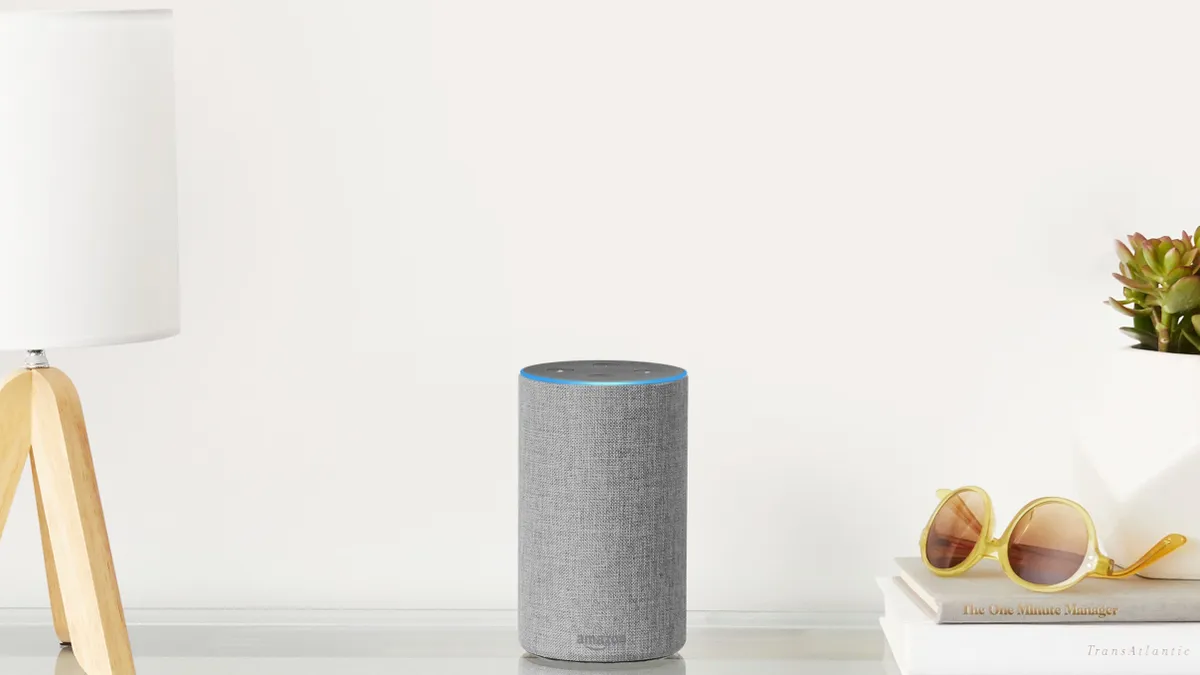Brief:
- Amazon has started to pitch major brands on piloting a new music audio ad format that could signal bigger advertising ambitions for its virtual assistant Alexa, Ad Age reported. The initiative is part of Amazon's plans to launch an ad-supported music streaming service to compete with the likes of Spotify and Pandora.
- A pitch deck obtained by Ad Age shows Amazon's guarantee that its "audio ads" reach millions of users, with campaigns commanding 1 million impressions. Testing the format is free for brands, but the campaigns only play for listeners who are not subscribed to Amazon Prime or Amazon Music Unlimited. Amazon has reached out to Colgate, L'Oréal and Lululemon about participating in the pilot, an agency executive told Ad Age. Tests will continue through this year and are expected to ramp up around the holidays, with plans to roll out the audio ads broadly in Q1 2020, according to the report.
- Early feedback an agency executive shared with Ad Age indicates the format, which runs 15 or 30 seconds of audio and includes an image for Alexa-powered devices with a screen, has flaws regarding ad insertion and usability for brands. The audio ads also don't let advertisers target their campaigns around specific shopper segments or choose music to pair their ads with. But Amazon's audio ads beat offerings from Spotify and Pandora when it comes to interactivity, advertisers told Ad Age, and the company's network for 100 million Alexa-ready devices could prove a draw.
Insight:
As audio becomes a more desirable channel for marketers in the music streaming and podcast era, Amazon appears to be shoring up the strength of Alexa as a potential advertising engine and competitive advantage against rival platforms. Advertisers for years now have been able to develop what Amazon calls skills for its virtual assistant, but have mostly used those tools for creating branded content, like how-tos, narrative storytelling and recipe guides, versus straightforward product advertising.
Alexa's shopping capabilities to date have also been mostly limited to rote, repeat items, and the new audio ad format still appears to have shortcomings in building a direct pipeline back to Amazon's e-commerce platform to complete a purchase. Audio ads don't guarantee a brand gets priority in search results, and can send listeners to Amazon for an entire product category versus for the advertising brand's specific product, which might result in users buying from a rival — one of the hurdles Amazon needs to address, an agency executive told Ad Age. If shoppers did move to purchase or take an action after listening to an ad, Amazon did not share that data, according to the report.
But even with kinks that need ironing out, Amazon's bigger push into paid audio product placement could signal trouble for Spotify and Pandora. Both companies leverage Amazon and Alexa as part of their pitch to advertisers, per Ad Age, but will more directly compete with the platform once it launches its own music streaming service. Spotify and Pandora have developed voice functions and audio marketing tools separately from Amazon, but the scale of Alexa remains an advantage.
Pandora in March opened up targeting options based on specific device types to advertisers, including on voice-powered smart speakers like Amazon Echo. The expansion was intended to help brands draw more interest toward their voice applications, and The National Cattlemen's Beef Association was an early adopter. The company last month also opened an in-house consultancy called Studio Resonate to help brands develop better audio marketing strategies.
Spotify, too, has dipped further into the voice space to innovate with its advertising. Ad Age in a separate report from May detailed Unilever's tests of voice-activated ads on Spotify for its Axe deodorant brand. Daniel Ek, the streamer's co-founder and CEO, told analysts during a call discussing Q1 earnings earlier this year that he believes voice across all platforms is a "critical" area of growth.













